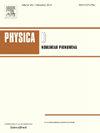Full Lyapunov exponents spectrum with Deep Learning from single-variable time series
IF 2.7
3区 数学
Q1 MATHEMATICS, APPLIED
引用次数: 0
Abstract
In this article we study if a Deep Learning technique can be used to obtain an approximate value of the Lyapunov exponents of a dynamical system. Moreover, we want to know if Machine Learning techniques are able, once trained, to provide the full Lyapunov exponents spectrum with just single-variable time series. We train a Convolutional Neural Network and use the resulting network to approximate the full spectrum using the time series of just one variable from the studied systems (Lorenz system and coupled Lorenz system). The results are quite surprising since all the values are well approximated with only partial data. This strategy allows to speed up the complete analysis of the systems and also to study the hyperchaotic dynamics in the coupled Lorenz system.

求助全文
约1分钟内获得全文
求助全文
来源期刊

Physica D: Nonlinear Phenomena
物理-物理:数学物理
CiteScore
7.30
自引率
7.50%
发文量
213
审稿时长
65 days
期刊介绍:
Physica D (Nonlinear Phenomena) publishes research and review articles reporting on experimental and theoretical works, techniques and ideas that advance the understanding of nonlinear phenomena. Topics encompass wave motion in physical, chemical and biological systems; physical or biological phenomena governed by nonlinear field equations, including hydrodynamics and turbulence; pattern formation and cooperative phenomena; instability, bifurcations, chaos, and space-time disorder; integrable/Hamiltonian systems; asymptotic analysis and, more generally, mathematical methods for nonlinear systems.
 求助内容:
求助内容: 应助结果提醒方式:
应助结果提醒方式:


